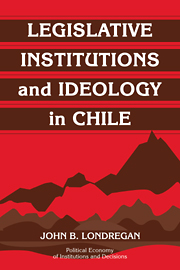Book contents
- Frontmatter
- Contents
- Acknowledgments
- Introduction
- 1 Ideology and Valence
- 2 Accident and Force
- 3 Legislative Institutions in the Constitution of 1980
- 4 Roll-Call Votes and Senate Committees
- 5 The Labor Committee
- 6 The Education Committee
- 7 The Constitution Committee
- 8 Legislative Politics and Chile's Transition Toward Democracy
- Conclusion
- A Estimating Preferences from Voting Records
- Bibliography
- Index
- Titles in the series
Conclusion
Published online by Cambridge University Press: 22 October 2009
- Frontmatter
- Contents
- Acknowledgments
- Introduction
- 1 Ideology and Valence
- 2 Accident and Force
- 3 Legislative Institutions in the Constitution of 1980
- 4 Roll-Call Votes and Senate Committees
- 5 The Labor Committee
- 6 The Education Committee
- 7 The Constitution Committee
- 8 Legislative Politics and Chile's Transition Toward Democracy
- Conclusion
- A Estimating Preferences from Voting Records
- Bibliography
- Index
- Titles in the series
Summary
When aircraft encounter turbulent storm conditions, the principals of aerodynamic design are not suddenly suspended. In the same way the dynamic political equilibrium during a democratic transition depends on the interaction of political actors' objectives and beliefs with the institutional constraints, just as it does in more normal times, notwithstanding the emotionally charged content of objectives that include victims' quest for justice and despite sudden changes in institutional constraints. The Chilean transition is notable for its reliance on a set of temporary policy guarantees that the former military government imposed as the price of transition. These policy conditions are protected by a series of institutional checks on a powerful and democratically elected executive. If one were to simply import the state-of-the-art models of gridlock used to analyze the U. S. Congress, this arrangement would seem to provide a permanent framework for indirect military rule. However, the family of models based on the agenda-setter model of Romer and Rosenthal (1978) ignores the potential for the agenda setter, in this case the Chilean president, to exploit the valence component of policy to pry acceptance from the veto player, in this application the median member of the Senate, for policy positions closer to the agenda setter and farther from the Senate median.
In the Chilean transition the president's ability to couple high-valence policy reforms with movements in the ideological content of policy has profound implications for the long-run effects of the constitution imposed by the military government.
- Type
- Chapter
- Information
- Legislative Institutions and Ideology in Chile , pp. 242 - 246Publisher: Cambridge University PressPrint publication year: 2000



